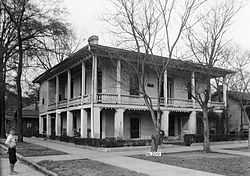Wesley Plattenburg House
|
Wesley Plattenburg House | |
 | |
|
As recorded by the Historic American Buildings Survey in 1934 | |
 | |
| Location | 601 Washington St., Selma, Alabama |
|---|---|
| Coordinates | 32°24′50″N 87°1′20″W / 32.41389°N 87.02222°WCoordinates: 32°24′50″N 87°1′20″W / 32.41389°N 87.02222°W |
| Built | 1842 |
| Architectural style | Greek Revival, Italianate |
| Governing body | Alabama Historical Commission |
| NRHP Reference # | 92001827[1] |
| Significant dates | |
| Added to NRHP | February 3, 1993 |
| Designated ARLH | March 22, 1991 |
The 'Wesley Plattenburg House is a historic house in Selma, Alabama. Featuring a unique combination of the Greek Revival and Italianate styles, it was completed in 1842 for Wesley Plattenburg.[2] Plattenburg was born on April 13, 1803 in Anne Arundel County, Maryland. He had relocated to Selma and had assumed the occupation of tailor by 1829. He became a successful merchant and served on the city council of Selma for many years.[3]
The house was once at the center of a 2,200-acre (890 ha) plantation that Plattenburg inherited from a close friend, Mr. Wood, upon his death. Plattenburg took up the vocation of planter after receiving the property.[3] The house is one the few structures remaining in the city that is identifiable on a map of the Battle of Selma. The city eventually grew to completely encompass the site.[2] The house was added to the Alabama Register of Landmarks and Heritage on March 22, 1991 and to the National Register of Historic Places on February 3, 1993.[1][4] It was listed on Alabama's Places in Peril in 2005.[2]
References
- ↑ 1.0 1.1 "National Register Information System". National Register of Historic Places. National Park Service. 2010-07-09.
- ↑ 2.0 2.1 2.2 "Plattenburg House". Alabama's Preservation Scorecard. Alabama Historical Commission. October 6, 2011.
- ↑ 3.0 3.1 Hardy, John (1879). Selma: Her Institutions and Her Men. Selma, Alabama. p. 190.
- ↑ "The Alabama Register of Landmarks & Heritage". preserveala.org. Alabama Historical Commission. May 31, 2011. Archived from the original on June 6, 2011. Retrieved June 6, 2011.
